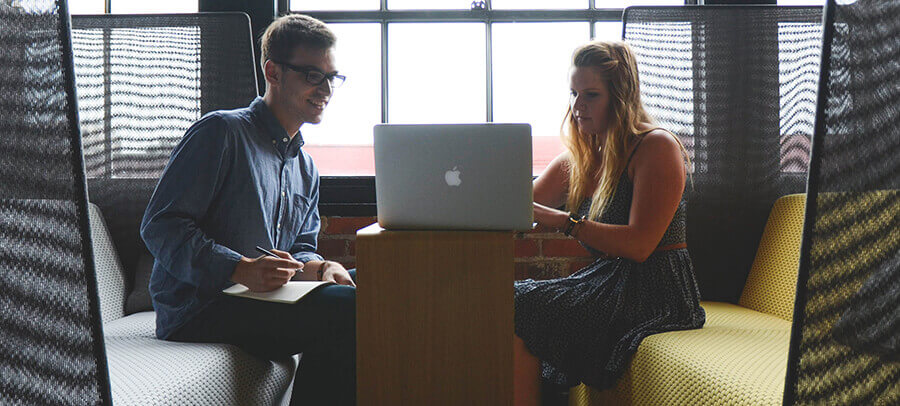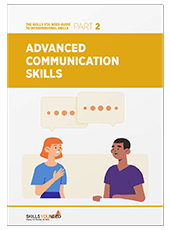3 Bad Habits That Might Be Hindering
You in Interviews
See also: Applying for Jobs
It goes without saying that people meeting you for the first time are likely to see you in a very different way compared to friends and family who’ve got to know you, and know your quirks and characteristics, over an extended period of time.
No time is more important for making a positive first impression count than in a job interview - and the truth is that, while your ‘air piano’ finger tapping might be considered endearing by your grandma, habits like this have the potential to hinder how you come across to your all-important potential employer.
As a result, in this article we’re identifying some common bad habits and characteristics that can be carefully ironed out and turned into some successful interview skills. These skills could make the difference between receiving a ‘welcome to the team’ phone call and finding a ‘good luck in your future endeavours email in your inbox.

Fight Off Fidgeting
You may not even be aware that you do these things, but, when it comes to playing with your hair or swivelling in your chair, these seemingly minor habits have the potential to make the wrong kind of impression come interview day.
Synonymous with discomfort and stress, excessive fidgeting can make you seem bored, disinterested or overly nervous and unfocused, as well as distracting your interviewer from what you’re saying.
Before going into your interview, it could be worthwhile videoing yourself during a mock interview to help you identify any bad habits you didn’t even realise you had and highlight areas where you need to develop before attending the real interview. Once you’re aware of any miscellaneous fidgeting characteristics, it will become easier for you to actively resist them when it comes to the big day and proceed to the next phase of the recruitment process with flying colours.
Additionally, there are plenty of other things you can do before your interview to reduce the risk of bad habits getting the better of you. For example, for coffee drinkers, we recommend swapping your double-shot flat white for a decaf alternative that will keep the fidgeting to a minimum by ridding you of the caffeine in your system that accelerates this. Alternatively, for those of you who find yourselves playing with your long locks or twiddling your thumbs, consider tying your hair up away from your face and lacing your fingers together - this will ensure you can resist the temptation to touch your hair, and you will appear more focused throughout the interview as a result.
Pay Attention to Personal Hygiene
It goes without saying that, if you feel happy with the way you look, you’re more likely to exude confidence. This is especially true in an interview situation where candidates are given a small window to shine and there’s little room for nerves to get in the way on the big day.
It’s therefore important to take as many precautions as possible to ensure you feel confident in the way you look. After all, it’s no secret that first impressions count, particularly when meeting your potential employer for the first time. So, we suggest paying attention to your presentation and looking after your appearance. Start by brushing your teeth and hair and ironing your clothes. Regardless of the dress code at the workplace you’re being interviewed at, looking like you’ve made a bit of effort will show that you’re serious about the job.
Be Aware of how Your Facial Expressions Come Across

To friends and family, your ‘resting face’ is accepted and unlikely to be given a second thought. However, for people meeting you for the first time, the face you pull when listening to someone could give off unintentionally negative signals and reflect badly on you as a result.
As mentioned, a good technique to help you get to know your ‘resting face’ is to video yourself in a mock interview situation to see how your face reacts to certain questions and pauses. This will allow you to identify instances where your facial gestures might come across as unwelcoming and help you rectify these in time for your interview. You could even ask a family member or a friend to join in a mock interview with you so that you can see the genuine expression on your face when asked a question.
It’s important to be mindful of how you look throughout the interview, so make sure your smile reaches your eyes and you resist the urge to excessively nod. While it’s great to look keen, too much nodding can make you come across as overly eager to please and create the impression that you’re not really listening to what the interviewer is saying.
Give yourself some time before your interview to really evaluate your bad habits, and don’t be afraid to ask your friends and family for some help identifying them in your mission to give the best interview possible! Remember to make sure before you step into the interview that you’re comfortable in what you’re wearing and how you’ve presented yourself - and that you’re fully prepared for any questions that may come your way. After all, this first impression really does count.
To help you with your first impression, we’re giving you a few extra hints and tips to help you succeed in securing the job:
- Research the company and the role
- Consider the most likely questions that you’re going to be asked before you even get to the interview
- Consider your personal appearance, and the appearance of a presentation if asked for one
- Focus on what you’re saying
- Smile
- Ask a question
- End it positively
Further Reading from Skills You Need
The Skills You Need Guide to Getting a Job
Develop the skills you need to get that job.
This eBook is essential reading for potential job-seekers. Not only does it cover identifying your skills but also the mechanics of applying for a job, writing a CV or resume and attending interviews.


